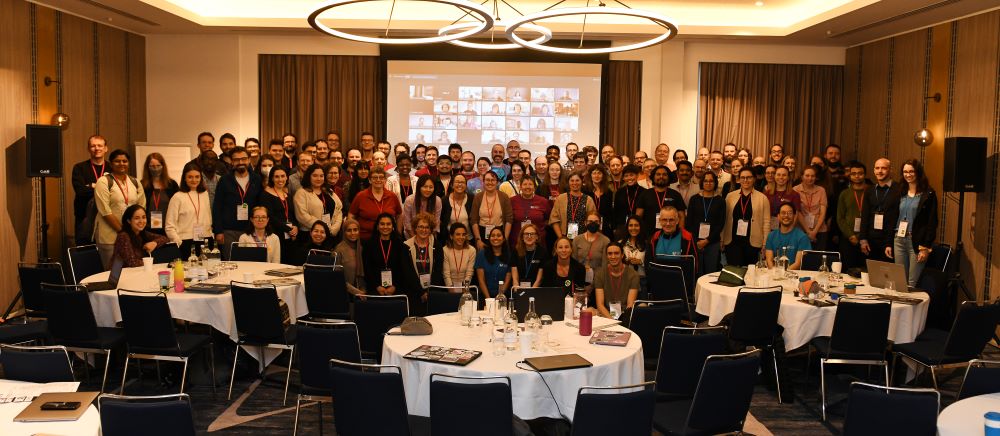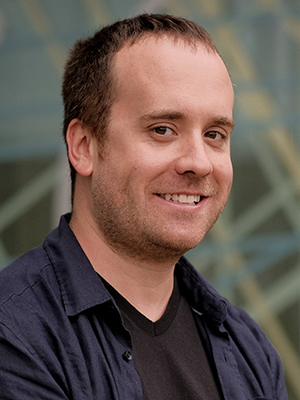CW23: My First Collaborations Workshop
Posted on 11 May 2023
CW23: My First Collaborations Workshop
Posted by d.barclay on 11 May 2023 - 9:00am

By Mike Simpson, PhD, Research Software Engineer, Newcastle University
Every year, the Software Sustainability Institute hosts the Collaborations Workshop, an event bringing together all kinds of people from across the UK and beyond to explore ideas around software and research.
This year, I attended my first CW, and I thought I’d take some time to write about my experience. What was it like? How does it differ from other events? Would I recommend it? Read on to find out!
First, some context:
The Software Sustainability Institute (SSI) has been trying to cultivate better, more sustainable research software since 2010. Their slogan: “Better Software, Better Research”, neatly summarises their goals (and you’ll rarely meet an RSE whose laptop is not adorned with stickers bearing that slogan!).
The Collaborations Workshops (CW) have been running for fifteen years, with the first taking place in 2009. As quoted on their website: “CW brings together researchers, software developers, managers, funders and more to explore important ideas in software and research and to plant the seeds of interdisciplinary collaborations.” CW23 was the first in-person CW since 2019, as well as the first hybrid event.
It was also my first CW, so I went into it not really knowing what to expect. I’m used to regular conferences, which mainly involve listening to other people talk — don’t get me wrong, I’ve watched some great talks — but this was different. So I was excited and more than a little nervous to see how it would play out.
Day 1
We arrived at the hotel to find a familiar welcome: registration, followed by coffee and a quick catch-up with familiar faces from the RSE Community. There was then an introduction to the workshop and the SSI, along with some tips for getting the most out of the event. We were also set a challenge: talk to at least seven new people during the workshop!
There was then a fascinating panel with senior members of the community, discussing career paths. The key takeaway was that a career can look impressive when you put it on paper in chronological order. It suggests that there was a clear plan that was being followed. However, the reality is, more often than not, a lot more chaotic and improvised (which was a reassuring thing to hear from these very successful people with impressive CVs!).
We then listened to a handful of lightning talks, many of which were setting up ideas for the Hack Day or just trying to start conversations about important topics.
A great start, though so far, it felt a lot like a traditional conference.
However, after a group photo and lunch, we entered the first Discussion Session. Our topic: “What resources, support and pathways are available for developing your career as an RSE?” It was an interesting discussion about a topic that I have pretty strong opinions about, and it was both edifying and unsurprising to see that other people feel the same way. We didn’t just focus on the negatives, however, and were able to share a few tips and resources with each other, which was great.
I missed part of the afternoon session because I wasn’t feeling well (I’m still recovering from going on holiday with a toddler!). However, I’ve heard nothing but good things from colleagues who attended the first set of mini-workshops.
By the evening, I was feeling better and was able to attend the drinks reception and dinner, which took place in the Manchester Museum. We were assigned tables for dinner, which gave us another chance to talk to some new faces, and it was a delightful evening; eating, drinking and chatting while surrounded by dinosaur bones, taxidermied animals of varying levels of quality, and the suspended whale skeleton in the Living Worlds gallery.
It was a long day but an interesting and enjoyable one.
Day 2
The next day opened with more mini-workshops. I found myself discussing the challenges of managing software projects in academia. How do you manage projects with such an extensive range of scales, participants and flexibility in how they play out? Are certain approaches (such as Agile) appropriate for use in RSE projects? I’m not sure we found any concrete answers, but it was certainly a fascinating discussion.
We then had a ‘Collaborative Ideas session’, where we were put into groups and encouraged to come up with an idea, either something for the Hack Day or something that would benefit the research software community. I floated an idea for continuing to support mental health within the community, based on the work of colleague and SSI Fellow Dave Horsfall, as that is something very dear to me. However, I didn’t have a concrete plan, so I was more than happy to work with everyone else on another idea called ‘Code Orchard’. We thought it would be useful to create resources for people who want to teach software engineering and data science, similar to the Software Carpentries but aimed at school-aged children. We wanted to promote the idea of solving problems and altruism through coding, and to encourage more people, especially young women, to get into the world of coding and research.
Our idea went on to win second prize, following a vote by our fellow delegates, and I hope is something that we can pursue further in the future.
Then followed some more interesting Lightning Talks and another mini-workshop session on Champion Programmes (like the SSI Fellowship), including how useful they are to the Champions and their careers, and what more can be done to improve these programmes moving forward.
That evening, there was a buffet dinner at the venue, which gave me a chance to rack up my ‘new people talked to’ count and gave me an opportunity to discuss some ideas I had for my own SSI fellowship application, which I am considering for later in the year.
Day 3
Unfortunately, I couldn’t stay for Day 3 of the Workshop, which was Hack Day. The idea was to get into teams and try to create prototypes or develop some of the ideas that had been suggested beforehand or came up in the sessions/conversations that took place over the first couple of days.
My colleagues who were able to attend said that it was a challenging but rewarding experience, and I hope to be able to stay for the Hack Day at future workshops.
Final Thoughts
So, that was my first experience of the SSI Collaborations Workshop.
I have to admit that I was slightly nervous about it. However, I am delighted to report that it was a welcoming atmosphere, everyone was so friendly, and I certainly felt included.
In general, it felt like a very inclusive event, not only for those who were there in person but — from what I could tell — for those who were joining remotely too. I know how difficult it can be to not only livestream the sessions but make it a worthwhile experience for online participants. It was not without its technical problems, but I thought it went surprisingly well, given that it was the first hybrid event (and, as a committee member for the RSE Conference in September, I was definitely taking notes!).
All in all, it was a fascinating and rewarding experience. I got a lot out of it personally, and if even a tiny percentage of the ideas and conversations that took place develop into anything, then I think the whole community will greatly benefit from it as well.
See you at CW24!

